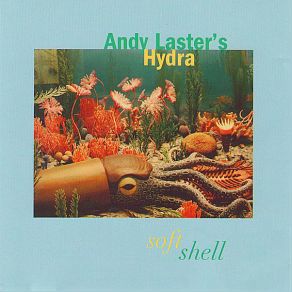Soft Shell
Download links and information about Soft Shell by Andy Laster. This album was released in 2000 and it belongs to Jazz, Avant Garde Jazz genres. It contains 11 tracks with total duration of 59:53 minutes.

|
|
|---|---|
| Artist: | Andy Laster |
| Release date: | 2000 |
| Genre: | Jazz, Avant Garde Jazz |
| Tracks: | 11 |
| Duration: | 59:53 |
| Buy it NOW at: | |
| Buy on iTunes $9.99 | |
Tracks
[Edit]| No. | Title | Length |
|---|---|---|
| 1. | Soft Shell | 6:31 |
| 2. | Here I'll Stay / Go | 9:41 |
| 3. | Like Plankton | 3:30 |
| 4. | Horripilate | 7:50 |
| 5. | Floating | 4:51 |
| 6. | No. 16 | 3:34 |
| 7. | South Shore Reform Experience, Part II | 2:49 |
| 8. | July Song | 7:15 |
| 9. | Tentacles | 5:04 |
| 10. | Hex | 3:40 |
| 11. | South Shore Reform Experience, Part VI | 5:08 |
Details
[Edit]Saxophonist/composer Andy Laster has sometimes been labeled as a chamber jazz musician, and it's often not difficult to see why. His compositions — particularly for New and Used and Orange Then Blue — can have a complexity akin to classical music, and Laster has been known to head in chamberesque directions with cellist Erik Friedlander both in his own Interpretations of Lessness and Friedlander's Topaz. Laster also sees value in understatement; possessing a warm and attractive tone on the alto, he generally steers clear of overblown multiphonics and other extended avant jazz techniques. But calling Laster a chamber jazz musician is too simplistic — he avoids the austere ECM Eurojazz model and can play with swing, soul, groove, and grit. Soft Shell by Laster's Hydra quartet has all those qualities, and the CD's name relates not only to an overall aquatic theme, but also aptly summarizes Laster's musical balancing act. Ornette Coleman's classic quartet is an obvious touchstone, with some of the same emphasis on melody and a sonic architecture inviting comparison to Ornette's pianoless circa-1960 band. One can certainly hear the influence of Ornette and Don Cherry in the Laster sax and Herb Robertson trumpet front line. However, Laster favors compositional subversions that aren't as slippery as Coleman's; his transitions can turn on a dime, and yet everything holds together thematically so that logic and flow are always maintained. Imagine Ornette's quartet mixed up with a classic early-'60s George Russell Riverside session and you might capture some of the flavor. And, of course, Laster must have force and muscle in his playing to avoid being completely overshadowed by Robertson, whose manic flurries of notes and wild plunger work have tended to draw the spotlight from whoever he plays with. Laster solos after Robertson on "Horripilate," a great multi-sectioned piece featuring strong counterpoint and multiple rhythmic change-ups, and manages to blister whatever paint remained on the studio wall after the trumpeter had finished. He also blows hot during the appropriately named "July Song," another lengthy track with a particularly spiky melody. Soft Shell even swings in a straight-ahead and accessibly post-boppish fashion now and then (e.g., "Tentacles") but most of the time Laster can't resist giving the Drew Gress and Tom Rainey rhythm section a lot of tricky stuff to follow in the charts. Of course, bassist Gress and drummer Rainey can easily manage anything thrown their way, having proven themselves in settings ranging from Tim Berne's Paraphrase to Fred Hersch's piano trio. Alternatingly silken and sandpapery, ruminative and cathartic, soft as a pillow and hard as an exoskeleton, Andy Laster's Hydra ultimately can't be pigeonholed. Which means that Laster has tended to cruise under the radar of many jazz fans who really ought to give a listen to what he has to offer. All of his albums have been well-conceived and strongly executed efforts, and Soft Shell is no exception.